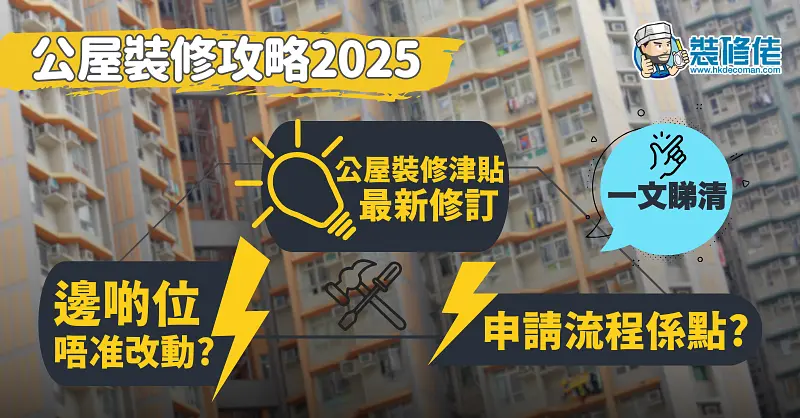Public Housing Decoration Guide
Listen to the blog audio:

For many Hong Kong citizens, successfully applying for public housing is an important step towards realizing the dream of a stable home. However, public housing decoration differs from private residences, being strictly regulated by the Housing Authority and subject to numerous restrictions. Therefore, residents planning to decorate must proceed with caution at every step to avoid violations. At the same time, the decoration period for public housing is limited, and homeowners must properly plan their time and resources. Renovation experts have specifically compiled the restrictions, application process, and precautions for public housing decoration to help residents easily and comfortably create their ideal home.
Public Housing Decoration Restrictions: What Items Cannot Be Changed? What Needs to Be Applied For?
Public housing decoration is regulated by the Housing Department's "Public Housing Decoration Guidelines." The fixed installations in the units are divided into three categories: A, B, and C, each with different modification restrictions. Before planning the decoration, the householder must clearly understand which items can be freely modified, which need to be applied for, and even which cannot be touched at all to avoid violations.
Below are the detailed specifications for the three types of installations:
| Installation Type | Decoration Specifications | Example Items |
|---|---|---|
| Type A | Cannot be modified | Main walls, fire doors, beams, unit doors, kitchen doors, soundproof windows, kitchen and toilet partition walls, sewage pipes, floor drains, household door plates, etc. |
| Type B | Written application and approval from the Housing Department required | Non-structural walls, kitchen and toilet floor tiles, wall plastering, security gates and locks, window grilles, shower stalls, bathtubs, washbasins, toilets, clothes drying racks, additional electrical switches, etc. |
| Type C | Can be freely modified | Interior paint colors, living room and bedroom floor tile styles, kitchen cabinets, door locks, doorbells, faucets, showers, etc. |
Tips:
- Type A installations involve the structural safety of the unit and must not be modified without authorization, otherwise it may lead to serious consequences, such as being required to restore the unit or terminate the lease.
- Modifications to Type B installations require submission of an application, and the Housing Department's approval process takes about a few weeks to a month. Householders should allow sufficient time.
- Modifications to Type C installations are more flexible, suitable for DIY enthusiasts, such as changing wall colors or faucets to add personal style.
- Householders can obtain the "Public Housing Decoration Guidelines" from the estate office or check the Housing Department's website to ensure familiarity with the specific requirements of their estate.

Renovation Deadline: Notice for New and Transfer Tenants
The renovation time for public housing is strictly limited. To prevent the misuse of resources, the Housing Authority has set clear deadlines for moving in and renovations, which vary depending on the tenant's status.
New Tenants:
- New public housing tenants enjoy a 14-day rent-free period, suitable for basic renovations.
- After the rent-free period, tenants must pay rent on time and complete the move-in within 60 days.
- If the renovation time is insufficient, an extension can be applied for, but additional rent will be charged. However, be aware that if the Housing Authority deems the extended period unreasonably long, the tenant may be considered to be misusing public housing resources and could be ordered to move out.
Transfer Tenants:
- Transfer tenants must return the original unit and complete the renovation and move-in of the new unit within 60 days of signing the new lease.
- An extension of up to 30 days can be applied for, but triple rent and rates will be charged.
- If the renovation is not completed on time without a reasonable explanation, the Housing Authority has the right to issue a notice to move out, terminating the lease.
Practical Advice:
To speed up the renovation process, tenants can prioritize purchasing ready-made furniture, reducing the proportion of custom-made furniture, which saves both time and costs. Additionally, planning renovation projects in advance ensures completion within the deadline, avoiding unnecessary trouble.

Application Process: From Form to Construction Steps
Public housing decoration requires formal application to ensure the project meets the Housing Department's requirements. Below are the detailed steps of the application process:
1. Request Application Form
- The householder needs to go to the respective estate property management office to request an application form, or download it from the Housing Authority website.
- Types of forms include: Self-decoration/Hired decoration company application form, Housing Authority approved decoration contractor application, air conditioner installation application, etc.
- When filling out the form, it is necessary to specify in detail the project items and locations, such as "Repainting the living room walls" or "Replacing kitchen floor tiles".
2. Submit Application
- Submit the completed application form along with necessary documents (such as a quotation) to the estate office.
- The Housing Department's approval process takes approximately a few weeks to a month, depending on the complexity of the project.
3. Construction After Approval
- After approval, the homeowner must post the original application in a conspicuous place in the unit for easy inspection by the Housing Department.
- Renovation workers must wear the staff permit issued by the Housing Department and register at the lobby.
- During construction, the Public Housing Renovation Guidelines must be followed, including not altering Class A installations and adhering to noise control hours.
Note:
If unauthorized alterations are found, the Housing Department may issue a restoration notice, requiring the resident to restore the unit within 60 days, otherwise, they may be ordered to move out and bear administrative costs. Serious violations (such as unauthorized alteration of structural walls) can lead to a maximum fine of HKD 400,000 and 2 years imprisonment, and if safety risks are involved, the fine can be up to HKD 1,000,000 and 3 years imprisonment.

Choosing a Renovation Contractor: Approved List vs Preferred Renovation Company
For public housing renovations, you can choose between Housing Authority approved renovation contractors or hire your preferred renovation design company. Each option has its pros and cons:
Housing Authority Approved Contractors:
Advantages: Familiar with public housing renovation restrictions, projects are usually completed on time, and meet the Housing Department's requirements.
Disadvantages: Mostly provide standardized renovation packages, with less flexibility in design.
Suitable for: Residents who seek "saving water and effort," especially newcomers unfamiliar with public housing regulations.
Favorite Renovation Design Company:
Advantages: Can create a personalized home style with high design flexibility.
Disadvantages: Need to ensure the company understands public housing restrictions and submit an application, with a longer approval time.
Suitable for: Residents who wish their home design to fit their daily life.
Recommendation:
Residents who want to choose their favorite renovation design company can consider finding a renovation company that truly meets their needs through a renovation matching platform. However, no matter which method is chosen, homeowners should confirm with the contractor or renovation company that the project complies with the "Public Housing Renovation Guidelines". Homeowners who choose to DIY also need to submit an application and ensure that they do not touch Class A installations.

➡️【Register now for free renovation quote】
Adhering to Noise and Construction Regulations
Public housing renovations are subject to the "Noise Control Ordinance" and Housing Authority regulations, with clear restrictions on construction times and methods:
Major renovations (such as wall demolition, use of heavy motorized equipment): Only allowed on weekdays from 7:00 AM to 7:00 PM, and prohibited all day on Sundays and public holidays.
Minor renovations (such as painting, use of portable mechanical tools): Can be carried out on weekdays from 7:00 AM to 11:00 PM, also prohibited on Sundays and public holidays.
Consequences of violation: Construction during restricted hours without a "Construction Noise Permit" may result in a fine of up to HKD 10,000 upon conviction, with continued violations possibly leading to increased fines or affecting the lease.
Other Regulations:
- Renovation workers must wear work permits and register in the lobby.
- During construction, the original application must be posted in a conspicuous place in the unit to facilitate surprise inspections by the Housing Department.
- Comply with the Minor Works Control System and the building deed regulations to ensure that the work is safe and compliant.
Tips:
Homeowners can communicate with neighbors in advance about the construction schedule to reduce complaints about noise. Choosing low-noise construction methods (such as manual tools) can also help minimize the impact.

Apply for Public Housing Decoration Allowance
To assist new public housing tenants in renovating their units, the Housing Department offers a "Vacant Unit Renovation Allowance," revised in November 2024, applicable to vacant units of all ages, with an amount equivalent to three months' rent.
Application Eligibility:
- Only new tenants of public housing estates are eligible; tenants who are relocated or living in estates scheduled for demolition are not applicable.
- Transit housing units and refurbished units are not included in the plan.
Note:
- After receiving the subsidy, the Housing Department will not carry out minor repairs on the unit in the first year to ensure the subsidy is used for its intended purpose.
- Household owners can use the subsidy for Category C installation changes or basic decoration to alleviate financial burdens.
Suggestion:
Household owners can combine the subsidy with DIY decoration, such as changing wall paint or faucets, to save money and add personality to their homes. For detailed application information, please contact the estate office or visit the Housing Department website.
One-stop Decoration Matching Platform
Decoration Master intelligently matches three decoration companies based on the needs of residents, allowing them to choose the most suitable partner to smoothly complete the entire decoration project. Homeowners planning to decorate, register now to get a free decoration quote.
Free to learn more about decoration quotes for different types of houses:
Public Housing|https://decoman-publichousing.com/
Private Housing|https://decoman-privatehousing.com/
New Properties|https://decoman-newproperties.com/
Tenement Buildings|https://decoman-tenement.com/
===============================================
The content and images of this article are provided by the columnist Hong Kong Decoman.
